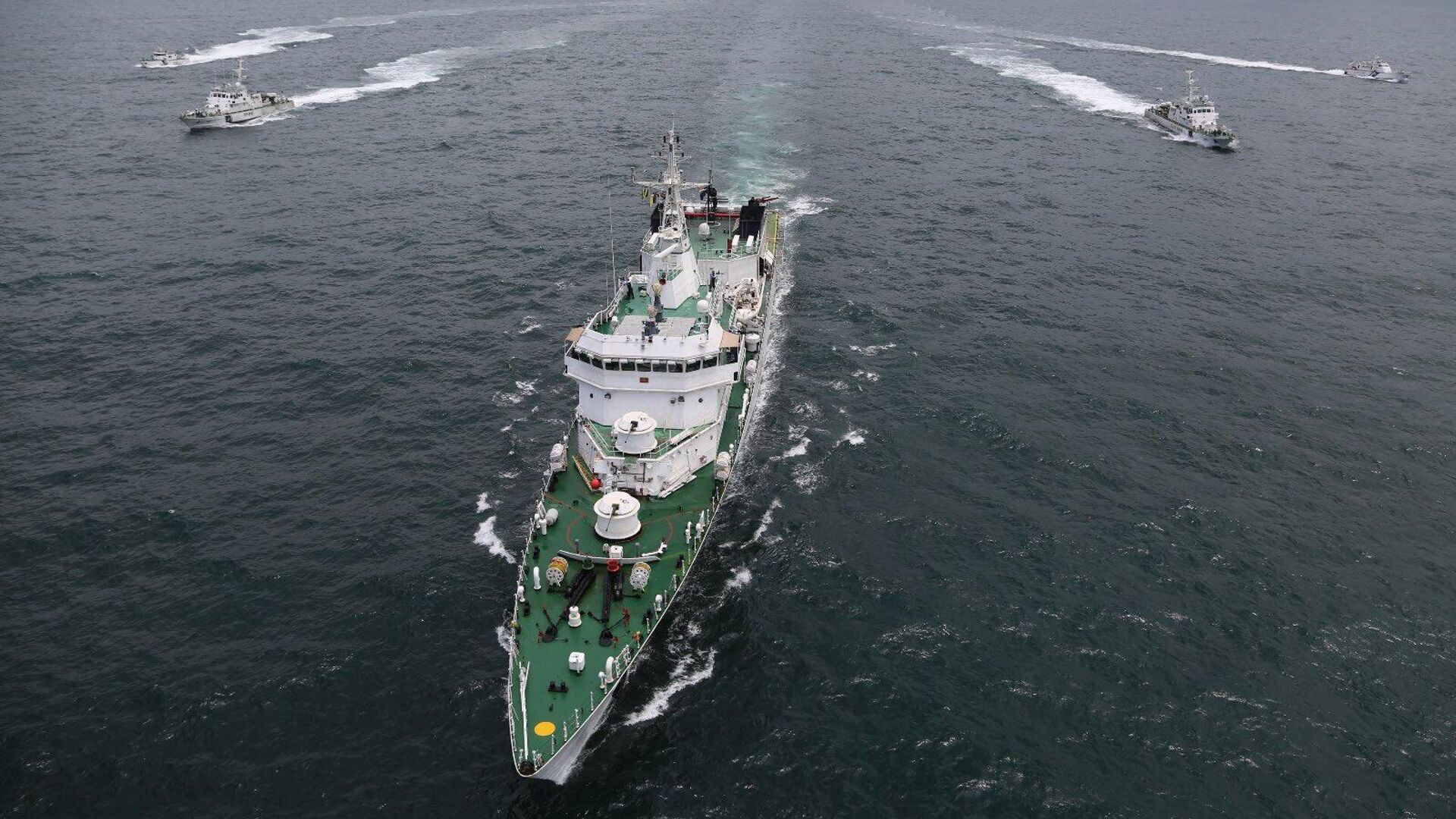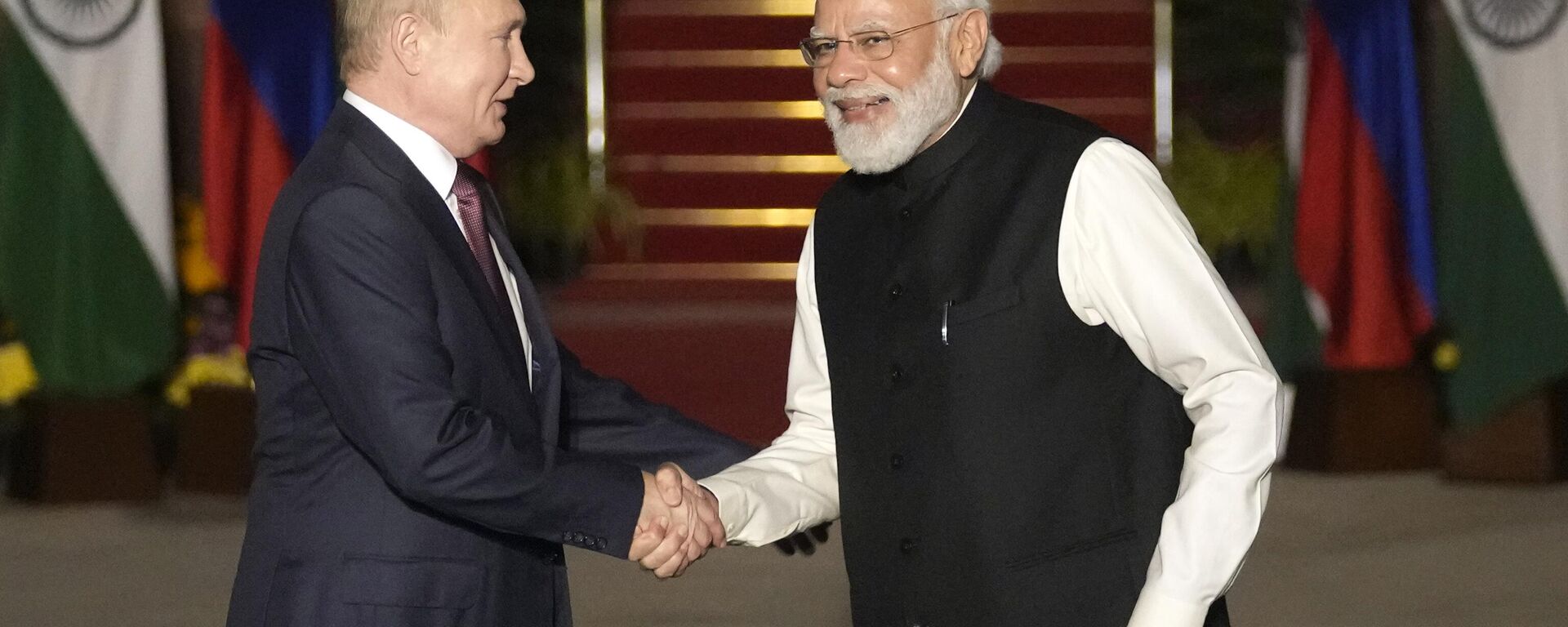https://sputniknews.in/20241121/rising-criminal-tide-engulfing-ocean-waters-how-indian-navy-tackles-piracy--smuggling-8424029.html
Rising Criminal Tide Engulfing Ocean Waters: How Indian Navy Tackles Piracy & Smuggling
Rising Criminal Tide Engulfing Ocean Waters: How Indian Navy Tackles Piracy & Smuggling
Sputnik India
The Indian Ocean, a vital artery for global trade and energy transportation, is increasingly beset by threats of piracy and smuggling. Sputnik India explores... 21.11.2024, Sputnik India
2024-11-21T12:04+0530
2024-11-21T12:04+0530
2024-11-22T17:15+0530
sputnik opinion
india
indian ocean
arabian sea
indian navy
bay of bengal
drug smuggling
arms smuggling
maritime security
mumbai
https://cdn1.img.sputniknews.in/img/07e8/02/01/6407337_0:104:1600:1004_1920x0_80_0_0_687c87e6cd81fad3a5490851513f5e52.jpg
The Indian Navy has been thwarting the nefarious designs of anti-India organisations by targeting narcotics smuggling routes in the Indian Ocean, confiscating large amounts of drugs in recent operations with other national security agencies, naval experts revealed.He believes that anti-narcotics operations are naturally intelligence-based initiatives. In response to requests from the Narcotics Bureau, ships from the Navy and Coast Guard are deployed to intercept vessels suspected of carrying contraband.Vice Admiral (Retd) Biswajit Dasgupta, former chief of the Eastern Naval Command of the South Asian nation, asserts that drug smuggling at sea, along with various other maritime threats, ranks on the lower end of the conflict spectrum. Consequently, both the Indian Navy and the Coast Guard possess sufficient capability to address this issue effectively.The problem with drug smuggling and indeed similar activities like arms smuggling or human trafficking lie in their covert nature and their chief goal of evading the law. While these activities do not directly threaten naval platforms, their infiltration into our country via sea routes can lead to significant disturbances on land, he noted.The Indian Navy veteran emphasized that, due to the covert nature of these activities, prompt action to apprehend or prevent them hinges on timely and actionable intelligence. In India, several agencies are tasked with distinct responsibilities for gathering, processing, and disseminating such intelligence.He reckons that the Navy will get involved if there is a possibility of intercepting such activity on the high seas, which may be well beyond the reach of other maritime agencies.Furthermore, the Indian Navy is renowned for its swift and decisive response to emerging threats and will promptly deploy the necessary resources to apprehend and deter the offenders, the military expert stressed.He pointed out that vulnerabilities in India’s coastal security were laid bare during the 26/11 terror attacks in Mumbai. Despite significant efforts and national expenditure, numerous challenges persist regarding the capabilities of the country’s Marine Police and the coordination among various agencies.The military affairs commentator contends that these vulnerabilities can be exploited by anti-national elements.The observer pointed out that effective intelligence, robust surveillance, and coordinated efforts among deployed units—coupled with seamless communication between ships of all nations engaged in anti-piracy operations—are crucial for thwarting piracy attempts and maintaining order at sea.Meanwhile, another Indian Navy veteran and author Manan Bhatt highlighted the Indian Navy's active role in countering drug smuggling in the Arabian Sea and the Indian Ocean region.Recently, the Indian Naval Ship Talwar, operating under the Combined Maritime Forces (CMF), seized 940 kg of drugs, including methamphetamines, hash, and heroin, from a dhow in the Arabian Sea.This operation, part of the Focused Operation Crimson Barracuda, underscores the Navy's commitment to disrupting criminal and terrorist activities at sea. Bhatt shed light on the fact that the Indian Navy joined the CMF—a 46-nation naval coalition—to strengthen its capabilities in deterring and combating illicit activities in these waters.Implications of Drug Seizures:These large-scale drug seizures to the tune of billions of dollars indicate a significant threat posed by anti-India outfits. These groups may be using drug trafficking as a means to fund terrorist activities and stir up nationwide social unrest, the strategic affairs pundit elaborated.He mentioned that the Indian Navy has employed several strategies to combat piracy effectively, and they include:Maritime Patrols and Escorts: Deploying warships to escort merchant vessels and conduct patrols in high-risk areas like the Gulf of Aden and the Western Arabian Sea.Maritime Intervention Operations (MIO): Continued deployment of the MARCOS Commandos for intervention operations to rescue hijacked vessels and thwart piracy attempts.International Collaboration: The Indian Navy actively engages in multilateral maritime exercises, joint surveillance operations, and coordinated patrols with friendly foreign countries to bolster maritime security. Additionally, the Navy collaborates with international maritime forces to share crucial information and coordinate responses to piracy threats.Proactive Engagement:The Indian Navy's forward-deployed warships maintain a prominent naval presence to deter piracy. These vessels conduct surveillance operations and issue essential warnings to commercial shipping to enhance safety at sea.
https://sputniknews.in/20241101/india-russia-defence-ties-to-grow-despite-us-sanctions-opinion-8351606.html
india
indian ocean
arabian sea
bay of bengal
mumbai
gujarat
Sputnik India
feedback.hindi@sputniknews.com
+74956456601
MIA „Rossiya Segodnya“
2024
Pawan Atri
https://cdn1.img.sputniknews.in/img/07e6/0c/13/139630_147:0:831:684_100x100_80_0_0_8fa2b25903e7787fe6a2698552c167df.png
Pawan Atri
https://cdn1.img.sputniknews.in/img/07e6/0c/13/139630_147:0:831:684_100x100_80_0_0_8fa2b25903e7787fe6a2698552c167df.png
News
en_IN
Sputnik India
feedback.hindi@sputniknews.com
+74956456601
MIA „Rossiya Segodnya“
Sputnik India
feedback.hindi@sputniknews.com
+74956456601
MIA „Rossiya Segodnya“
Pawan Atri
https://cdn1.img.sputniknews.in/img/07e6/0c/13/139630_147:0:831:684_100x100_80_0_0_8fa2b25903e7787fe6a2698552c167df.png
india, indian ocean, arabian sea, indian navy, bay of bengal, drug smuggling, arms smuggling, maritime security, mumbai, 2008 mumbai attacks, gujarat
india, indian ocean, arabian sea, indian navy, bay of bengal, drug smuggling, arms smuggling, maritime security, mumbai, 2008 mumbai attacks, gujarat
Rising Criminal Tide Engulfing Ocean Waters: How Indian Navy Tackles Piracy & Smuggling
12:04 21.11.2024 (Updated: 17:15 22.11.2024) The Indian Ocean, a vital artery for global trade and energy transportation, is increasingly beset by threats of piracy and smuggling. Sputnik India explores potential solutions to these twin challenges.
The Indian Navy has been thwarting the nefarious designs of anti-India organisations by targeting narcotics smuggling routes in the Indian Ocean, confiscating large amounts of drugs in recent operations with other national security agencies, naval experts revealed.
“Drugs are a source for generating funding for anti-national activities and also making money for criminals in the country,” Admiral Sunil Lanba (Retired), an ex-chief of the Indian Navy said in a conversation with Sputnik India.
He believes that anti-narcotics operations are naturally intelligence-based initiatives. In response to requests from the Narcotics Bureau, ships from the Navy and Coast Guard are deployed to intercept vessels suspected of carrying contraband.
Vice Admiral (Retd) Biswajit Dasgupta, former chief of the
Eastern Naval Command of the South Asian nation, asserts that drug smuggling at sea, along with various other maritime threats, ranks on the lower end of the conflict spectrum. Consequently, both the
Indian Navy and the Coast Guard possess sufficient capability to address this issue effectively.
The problem with drug smuggling and indeed similar activities like arms smuggling or human trafficking lie in their covert nature and their chief goal of
evading the law. While these activities do not directly threaten naval platforms, their infiltration into our country via sea routes can lead to significant disturbances on land, he noted.
The Indian Navy veteran emphasized that, due to the covert nature of these activities, prompt action to apprehend or prevent them hinges on timely and actionable intelligence. In India, several agencies are tasked with distinct responsibilities
for gathering, processing, and disseminating such intelligence. “This is key to combating the menace. This is a constabulary task for maritime forces, namely the Indian Navy, the Coast Guard, the Marine Police, Customs, the Directorate of Revenue Intelligence (DRI), Port Authorities, and all other agencies involved in maritime security, Dasgupta told Sputnik India on Wednesday.
He reckons that the Navy will get involved if there is a possibility of intercepting such activity on the high seas, which may be well beyond the reach of other maritime agencies.
Furthermore, the Indian Navy is renowned for its swift and decisive response to emerging threats and will promptly deploy the necessary resources to
apprehend and deter the offenders, the military expert stressed.
“These are nefarious designs of anti-India outfits to fund terrorist activities to create social unrest in the country. Drug-smuggling is the source of huge amounts of illegal funding to terrorist organisations and other anti-national groups. This money is used for indoctrinating young people and for the procurement of arms and explosives, which are then deployed to create disturbances within the country," Dasgupta noted.
He pointed out that vulnerabilities in India’s coastal security were laid bare during the 26/11 terror attacks in Mumbai. Despite significant efforts and national expenditure, numerous challenges persist regarding the capabilities of the country’s Marine Police and the coordination among various agencies.
The military affairs commentator contends that these vulnerabilities can be exploited by anti-national elements.
The observer pointed out that effective intelligence, robust surveillance, and coordinated efforts among deployed units—coupled with seamless communication between ships of all nations engaged in anti-piracy operations—are crucial for thwarting piracy attempts and maintaining order at sea.
“On the other hand, piracy has to be dealt with using a firm hand. The Indian Navy is perhaps the only navy that has taken strong and decisive actions against pirate attacks and piracy threats ever since piracy became prevalent in the Gulf of Aden and the Somali coast in 2008. It has been largely due to the Indian Navy's efforts that the 'high-risk area' in the Arabian Sea was reduced and kept to manageable limits and trade through the region has continued to flow,” Dasgupta stressed.
Meanwhile, another Indian Navy veteran and author Manan Bhatt highlighted the Indian Navy's active role in countering drug smuggling in the Arabian Sea and the Indian Ocean region.
Recently, the Indian Naval Ship Talwar, operating under the Combined Maritime Forces (CMF), seized 940 kg of drugs, including methamphetamines, hash, and heroin, from a dhow in the Arabian Sea.
This operation, part of the Focused Operation Crimson Barracuda, underscores the Navy's commitment to disrupting criminal and terrorist activities at sea. Bhatt shed light on the fact that the Indian Navy joined the CMF—a 46-nation naval coalition—to strengthen its capabilities in deterring and combating illicit activities in these waters.
Implications of Drug Seizures:These large-scale drug seizures to the tune of billions of dollars indicate a significant threat posed by anti-India outfits. These groups may be using drug trafficking as a means to fund terrorist activities and
stir up nationwide social unrest, the strategic affairs pundit elaborated.
“The involvement of foreign nationals and the use of sophisticated smuggling routes indicate a well-organised network aimed at destabilizing the region. The proceeds from drug trafficking are increasingly being used to support armed groups and fund terrorism, posing a serious challenge to national security,” Bhatt stated.
He mentioned that the Indian Navy has employed several strategies to combat piracy effectively, and they include:
Maritime Patrols and Escorts: Deploying warships to escort merchant vessels and conduct patrols in high-risk areas like the Gulf of Aden and the Western Arabian Sea.
Maritime Intervention Operations (MIO): Continued deployment of the MARCOS Commandos for intervention operations to rescue hijacked vessels and thwart piracy attempts.
International Collaboration: The Indian Navy actively engages in multilateral maritime exercises, joint surveillance operations, and coordinated patrols with
friendly foreign countries to bolster maritime security. Additionally, the Navy collaborates with international maritime forces to share crucial information and coordinate responses to piracy threats.
Proactive Engagement:The Indian Navy's forward-deployed warships maintain a prominent naval presence to deter piracy. These vessels conduct surveillance operations and issue essential warnings to commercial shipping to enhance safety at sea.



